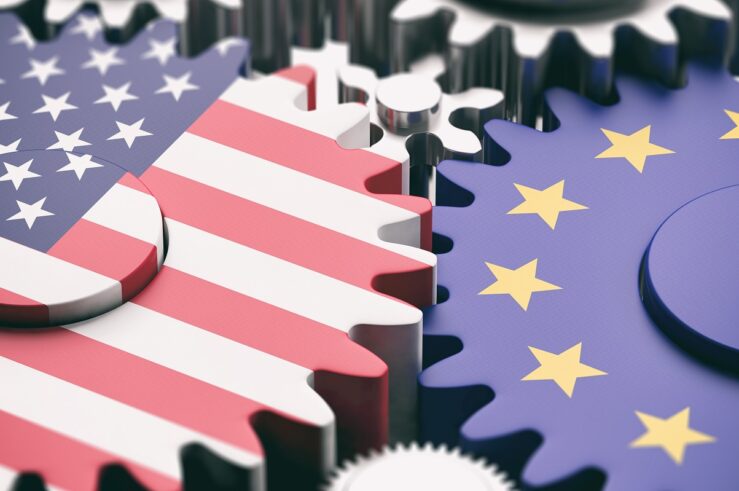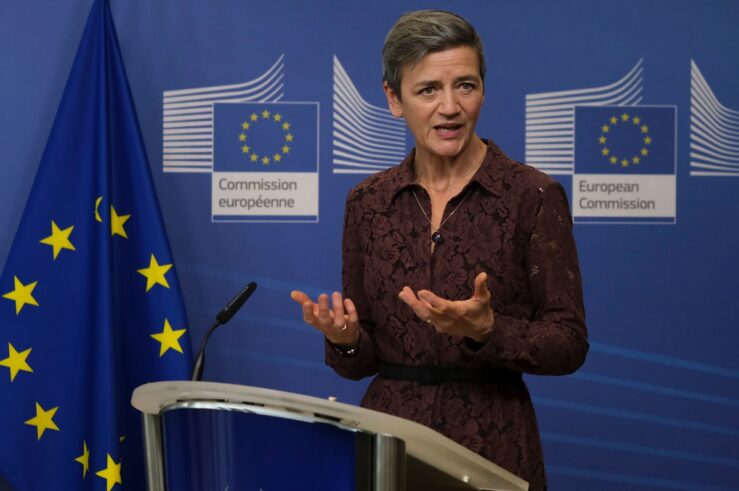Showing archive for: “EU”
The FTC, DOJ, and International Competition Law: Convergence Away From the Consumer Welfare Standard?
In less than two and a half years, the Federal Trade Commission (FTC) and U.S. Justice Department (DOJ) have undone more than two decades of work aimed at moving global competition law toward an economics-friendly consumer welfare standard. In tandem with foreign competition authorities, the U.S. antitrust agencies are now cooperating in an effort to ... The FTC, DOJ, and International Competition Law: Convergence Away From the Consumer Welfare Standard?
Will the EU-U.S. Data Privacy Bridge Hold?
With the European Commission’s recent announcement that it had deemed the revamped data-protection framework from the United States to be “adequate” under the European Union’s stringent General Data Protection Regulation (GDPR), the stage is set for what promises to be a legal rollercoaster in the European Court of Justice (CJEU). The Commission’s decision is certain ... Will the EU-U.S. Data Privacy Bridge Hold?
Goodbye Margrethe, Hello Didier: What Next for European Competition Law?
European Commissioner for Competition Margrethe Vestager announced Sept. 5 that she was leaving her position after nearly a decade in charge, which for the last four years has also included holding the title of “executive vice president of the European Commission for a Europe fit for the Digital Age.” Her departure caps off an uncharacteristically ... Goodbye Margrethe, Hello Didier: What Next for European Competition Law?
Uber and the Mill of Sanssouci
Freedom of enterprise is considered a second-class freedom in Spain, rather than a fundamental right. It is clear that this has been the view not only of successive Spanish governments since the current Constitution was promulgated in 1978, but also of the judges of the Supreme Court of Spain (Tribunal Supremo) and the Constitutional Court ... Uber and the Mill of Sanssouci
Norwegian Decision Banning Behavioral Advertising on Facebook and Instagram
The Norwegian Data Protection Authority (DPA) on July 14 imposed a temporary three-month ban on “behavioural advertising” on Facebook and Instagram to users based in Norway. The decision relied on the “urgency procedure” under the General Data Protection Regulation (GDPR), which exceptionally allows direct regulatory interventions by other national authorities than the authority of the country ... Norwegian Decision Banning Behavioral Advertising on Facebook and Instagram
The CJEU’s Decision in Meta’s Competition Case: Sensitive Data and Privacy Enforcement by Competition Authorities (Part 2)
Yesterday, I delved into the recent judgment in the Meta case (Case C-252/21) from the Court of Justice of the European Union (CJEU). I gave a preliminary analysis of the court’s view on some of the complexities surrounding the processing of personal data for personalized advertising under the GDPR, focusing on three lawful bases for ... The CJEU’s Decision in Meta’s Competition Case: Sensitive Data and Privacy Enforcement by Competition Authorities (Part 2)
Enforcing the DMA is Easier Said Than Done: Evidence From the Commission’s Draft Template for DMA Compliance Reports
The European Commission early last month published its draft template for DMA-compliance reports. This is the document that gatekeepers will periodically need to fill out, and which subsequently will be used to determine whether they comply with the European Union’s Digital Markets Act (DMA). The draft template is a missed opportunity to clarify some of ... Enforcing the DMA is Easier Said Than Done: Evidence From the Commission’s Draft Template for DMA Compliance Reports
The CJEU’s Decision in Meta’s Competition Case: Consequences for Personalized Advertising Under the GDPR (Part 1)
Today’s judgment from the Court of Justice of the European Union (CJEU) in Meta’s case (Case C-252/21) offers new insights into the complexities surrounding personalized advertising under the EU General Data Protection Regulation (GDPR). In the decision, in which the CJEU gave the green light to an attempt by the German competition authority (FCO) to ... The CJEU’s Decision in Meta’s Competition Case: Consequences for Personalized Advertising Under the GDPR (Part 1)
Two FCC Commissioners Walk Into a Bar
Former FCC Commissioners Have Some Thoughts Writing with Kirk Arner in RealClearMarkets, Harold Furchtgott-Roth—formerly of the Federal Communications Commission (FCC)—comments on the Spectrum Auction Reauthorization Act, recently passed out of the House Energy and Commerce Committee. Arner and Furchtgott-Roth note that reauthorizing spectrum auctions is a “good and necessary idea,” but take issue with the “$23 billion Ponzi ... Two FCC Commissioners Walk Into a Bar
There’s Nothing ‘Fair’ About EU Telecoms’ Proposed ‘Fair Share’ Plan
The European Commission’s recently concluded consultation on “the future of the electronic communications sector and its infrastructure” was a curious phenomenon in which the commission revived the seemingly dead-and-buried idea of a legally mandated “sender pays” network-traffic scheme, despite the fact that it remains as unpopular and discredited as it was when last discussed roughly ... There’s Nothing ‘Fair’ About EU Telecoms’ Proposed ‘Fair Share’ Plan
Antitrust at the Agencies Roundup: Pruning the Data Tree Edition
In my last roundup, I puzzled over the Federal Trade Commission’s (FTC) suit to block Amgen’s acquisition of Horizon Therapeutics. The deal involved no product overlaps whatsoever (i.e., no horizontal competition), a target firm acknowledged to have no competitors for the orphan drugs at issue, and nobody poised to enter into competition either. I won’t ... Antitrust at the Agencies Roundup: Pruning the Data Tree Edition
If the UK Wants to Remain a Tech Leader, It Needs Less Regulation, Not More
Brexit was supposed to free the United Kingdom from Brussels’ heavy-handed regulation and red tape. But dreams of a Singapore-on-the-Thames are slowly giving way to ill-considered regulation that threatens to erode Britain’s position as one of the world’s leading tech hubs. The UK Competition and Markets Authority’s recent decision to block the merger of Microsoft ... If the UK Wants to Remain a Tech Leader, It Needs Less Regulation, Not More












